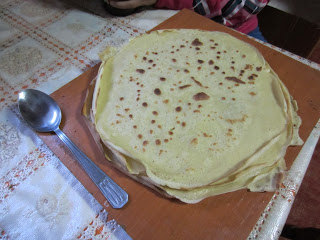Monday, September 30, 2013
Two Weeks in Zăneşti
I came to Romania in part to search for family roots, and, here in Zăneşti, I gained a new family.
I realized this after about a week, as I was bicycling behind my host family's ten-year-old girl, on our way to the village park to play soccer with the local children. This family took care of me like I'd been born into it.
Language-wise, it was a full immersion experience. Needless to say, I learned to comprehend a LOT of Romanian very quickly. During one of my first nights, I said "ma numesc" (my name is) instead of "mulțumesc" (thank you) upon receiving a mug of Turkish-like coffee--we all had a good laugh. Learning a new language in an environment where said language is the only one spoken can make one feel like a child again; I'm sure that I sounded like a four-year-old for most of my stay. Romanian is a beautiful, yet complicated language--close to Latin, flexible word order, complex and unpredictable conjugations and tenses (especially for native speakers of English), its having been influenced by Greek, Hungarian, Turkish, German, French, and Italian.
While playing soccer with the village children, I had this realization that "playing ball" is like speaking a universal language. The cooperation, the gestures, the implicit understanding, the implicit "togetherness" of a newly formed team like an instant friendship of understanding. For these two weeks, I felt as if I were reliving a second childhood. The children regarded me as a playmate, and they didn't care whether or not I could understand or speak their language well. One day, a little boy wiped out on the asphalt. As he cupped his scraped elbow and mouthed a silent sensation of pain, four little girls gathered around him. Then, one by one, they pointed out their own scars on their hands, arms, legs. This language, much like the one of playing ball, comforted him, and it was such a special thing to witness.
Monday, September 16, 2013
All of the food comes from the garden, or a neighbor's garden, or a neighbor's cow, or straight from the tree. We even took a trip to the village mill to turn grain into flour for making bread.
And tomatoes:
Carrot from the backyard garden:
Land like cracked plaster (you can knock on it):
In the backyard garden:
Parsley:
A bucket of beans:
Romanian peanuts:
Romanian nutcracker:
Flour, salt, yeast:
Almost time for the oven:
Traditional Romanian doughnuts:
With homemade strawberry jam:
Sarmale, traditional romanian food:
Vegetables fermenting in the sun:
Saturday, September 7, 2013
Hello from Zanesti, Romania! (I’ve had limited internet
access this past week, so I’m just getting around to blogging now.) Thanks to
the Global Fellowship, this is my first opportunity to travel alone, and my
first trip to Europe.
Three
generations back, my dad’s family came from Romania. A cousin of mine did some
research, and says that the name Skurtu (keeping in mind slight spelling changes
due to immigration) originated in Sibiu, Romania. So it is I’ve decided to
travel to Sibiu to experience the culture and to see if I can find any
information about my family history. After a couple months of asking around for
names of ancestors, I’ve got only two names in my pocket—I’m aware that my
search might not turn up anything, and I’m ok with that.
I
was going to fly to Sibiu, but a friend of a friend invited me to travel with
her to Zanesti, a village in Northeast Romania, to visit her family. This was
incredibly kind of her, as she hadn’t even met me. In fact, we met for the
first time in the Rome airport, five minutes before our flight would depart to
Bacau.
The
plane landed in the evening, and I stepped outside to see an expanse of pasture
surrounded by mountains. My baggage didn’t arrive (until almost five days later). I filled out a form, and
then had a beer with my friend while we waited for her family to pick us up. The first thing I learned about Romanian culture is that there’s a superstition
about placing bags on tables. (At the airport, I set my purse down on the table
for a moment, and I haven’t done it since.)
We
drove down one road for the better part of an hour, and arrived at my friend’s
family’s house. We walked through a lush flower garden and entered the summer
kitchen, a small cottage-like building in the back yard. Within ten minutes we
were eating: homemade bread, tomatoes, bors (a soup with a slightly sour broth,
parsley, carrots, pepper—pronounced “borsh”) with chicken (raised in the yard),
vegetable fritters, eggplant spread, sausage, salami, coffee (similar to
Turkish), more bread—everything fresh from the garden.
I
went to bed with the fullest stomach in recent memory (and in borrowed pajamas),
and woke the next morning to the clack-clack
clack-clack of horses on the road.
Subscribe to:
Posts (Atom)























